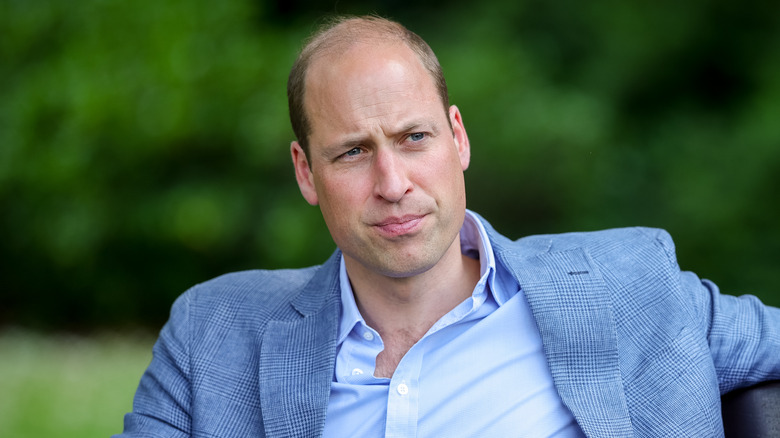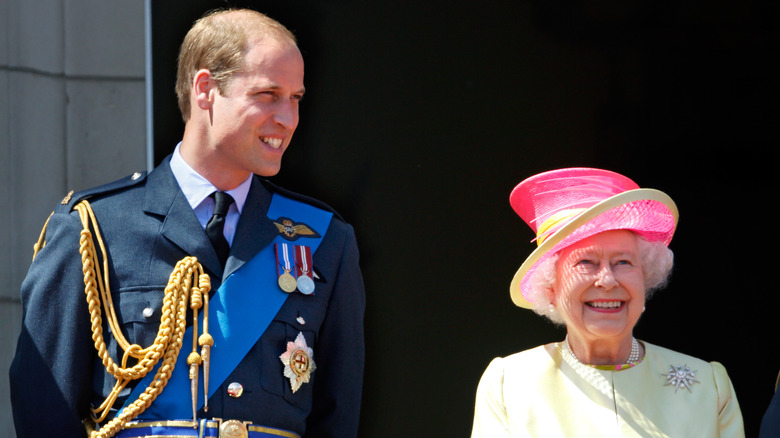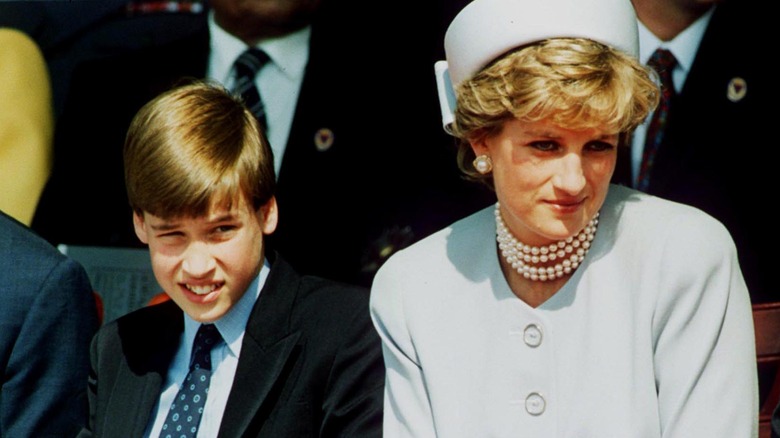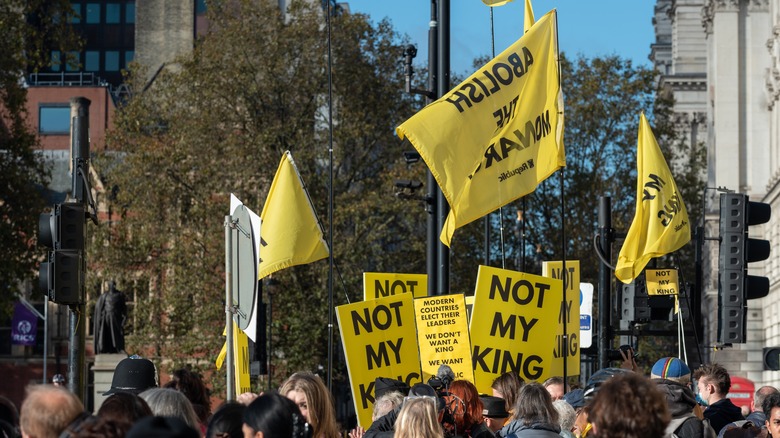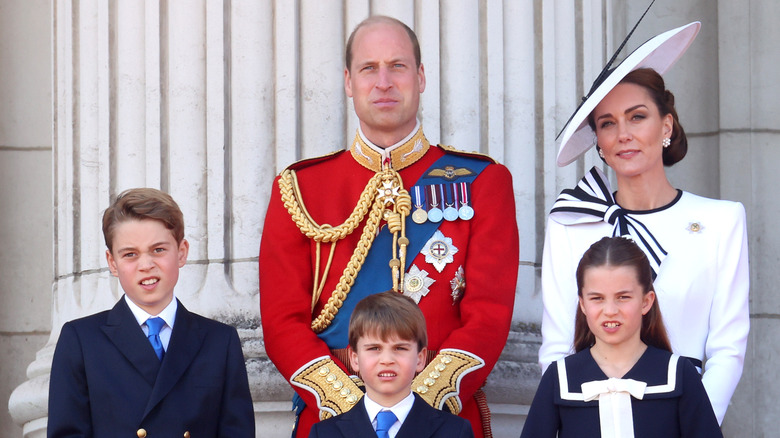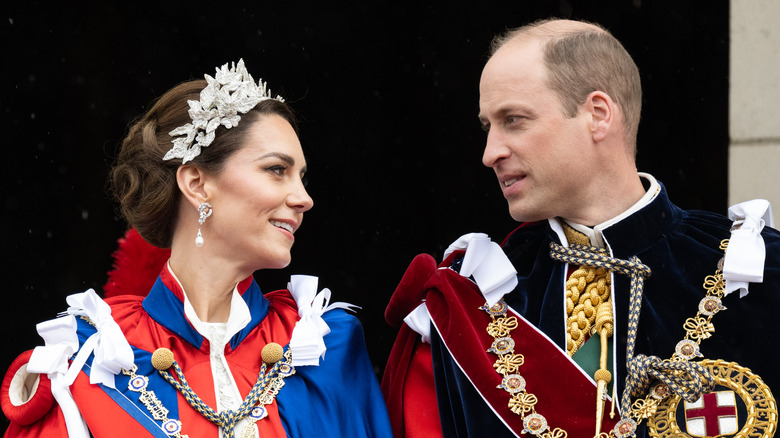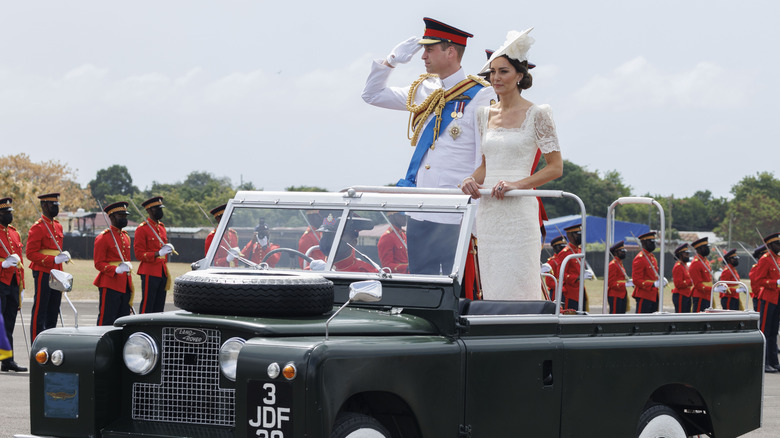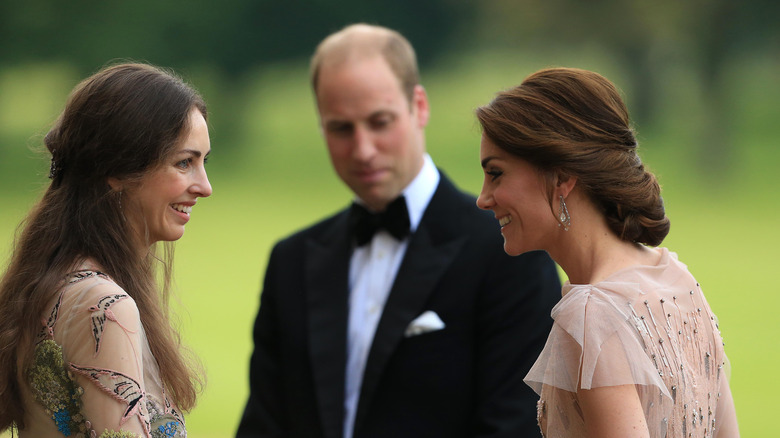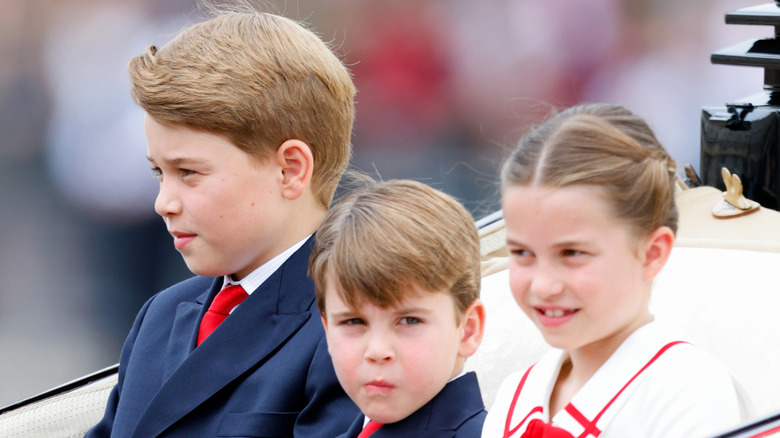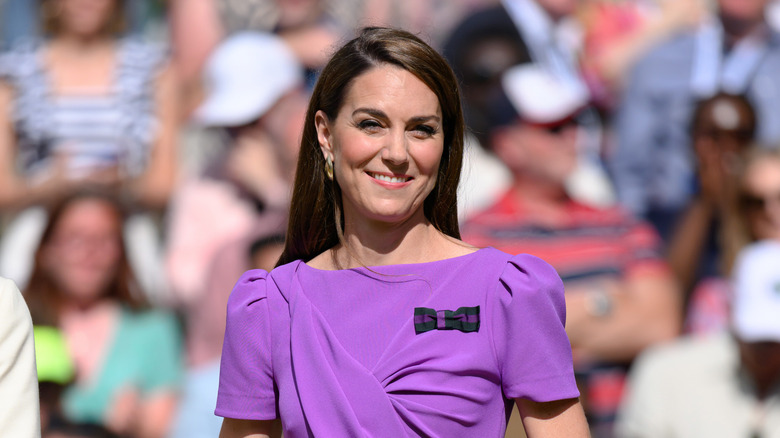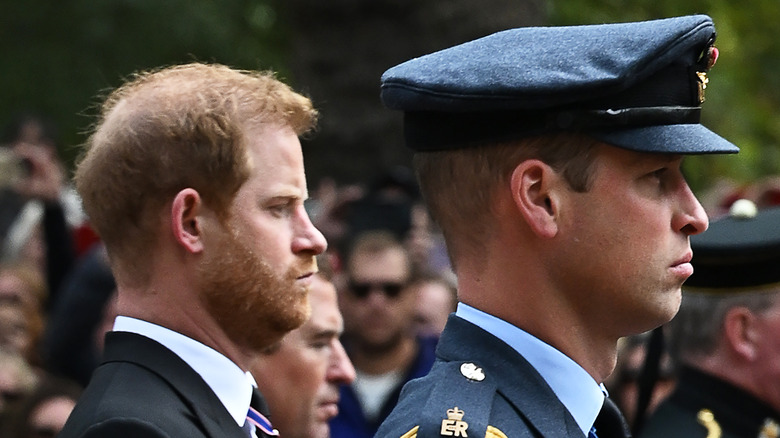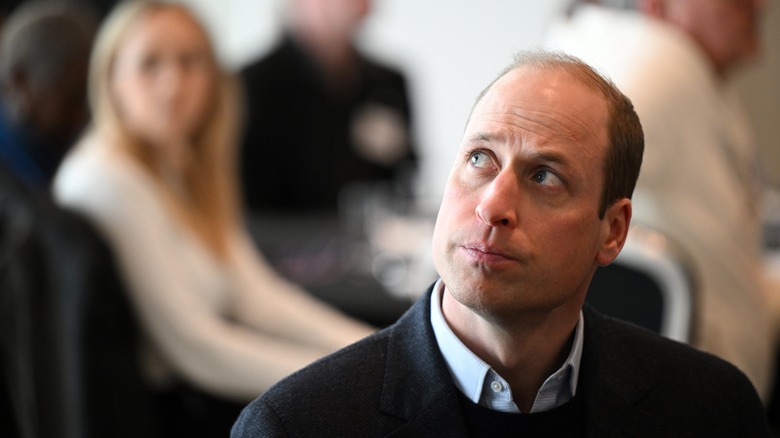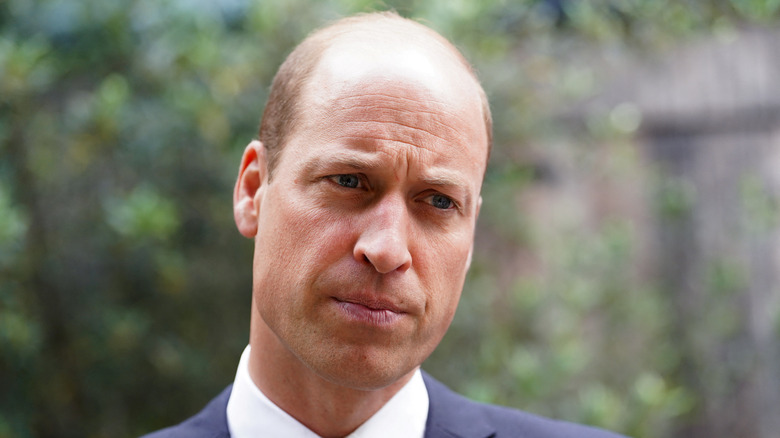Unique Challenges Prince William Faces As A Future King
Prince William's destiny was etched in stone the day he was born. As the first son of the heir to the throne of Britain, William has known since childhood that he would one day assume the position of monarch, a role held by his grandmother, Queen Elizabeth II, for an unprecedented 70 years. When King Charles III ascended to the throne in September 2022 upon the queen's death at age 96, William bumped up next in line. Given his father's advanced age at the time — 73, the oldest British monarch to ever be crowned — William won't have to wait nearly as long for his turn.
However, when the king announced that he'd been diagnosed with an unspecified form of cancer, there was immediate speculation that William may sadly take his place as head of "the firm" far sooner than anticipated. With the state of Charles' health an open question (he reportedly began undergoing treatment in January 2024), William began ramping up his royal duties to pick up the slack. Meanwhile, he's also endured the added heartbreak of his wife, Princess Catherine, revealing her own cancer diagnosis.
This was an understandably fraught time for Britain's royal family, with William concerned about his father's fate while preparing for the possibility that he may be taking his place sooner than he'd expected. Read on to examine the unique challenges Prince William faces as a future king.
He'll inevitably be compared to his grandmother, Queen Elizabeth
Since childhood, Prince William had a special relationship with his grandmother, Queen Elizabeth II. Part of that was the simple fact that he was the monarch's first grandchild, but a far bigger reason was that he would one day inherit her crown. As royal historian Robert Lacey wrote for People, it was William's grandfather, Prince Philip, who came up with the idea to set up regular lunches between William and the queen so she could mentor him in the intricacies of the monarchy. "When the time came for the queen to talk business with William, Philip would quietly excuse himself because he didn't feel that the constitutional side of the queen's job was something he wanted to interfere in," Lacey wrote.
As a result, William has approached his role as a royal by embracing the queen's well-known mantra of "never complain, never explain." This has clearly benefited William's public image; a 2023 poll by Sky News found William to be the most popular member of the royal family, with a 61% approval rating (nearly 10 points higher than the 52% rating of his father, King Charles).
When William becomes king, he'll inevitably be compared to his grandmother. However, the Prince of Wales has already taken steps to ensure those comparisons are more favorable than not. "At this crucial inflection point, William ... continues to model his leadership on the style he learned from his grandmother," Lacey said.
He'll also be compared to his mother, Princess Diana
When Prince William becomes king, not only will he be compared with his grandmother and her historic 70-year reign, but he'll also face comparisons with his mother, the late Princess Diana. While Queen Elizabeth II was an immensely popular figure, that popularity was easily eclipsed by that of the "people's princess," who was arguably the most famous woman on the planet when she died in a Paris car accident in 1997. It's a given that William, as king, will do everything in his power to keep his mother's legacy alive.
Princess Diana was truly beloved; as popular as William is, it's fair to say that he'll likely never receive the level of adulation that greeted his mother. That said, William's relationship with Britain's notoriously aggressive tabloid press has been informed by the treatment his mother received, which ultimately contributed to her death. As a result, William would rather make an end-run around the tabloids than deal with them directly.
According to Simon Lewis, the former communications secretary to Queen Elizabeth, that was evident in the PR firestorm that ensued when a manipulated photograph of Princess Catherine was posted prior to the announcement of her cancer diagnosis. "He's going straight over their heads, giving out pictures which have been doctored, straight to the public, which have been taken on their own devices," said Lewis during an episode of his BBC podcast, "When It Hits The Fan," (via Australia's ABC.net).
William will be forced to confront growing anti-monarchist sentiment
It's no secret that Britain's monarchy is an outdated relic that has had little relevance since the Reform Act of 1832 ushered in parliamentary democracy. While a wide swath of the British public supports royalty, a significant portion of the population is actively rooting for the institution's demise. That was apparent during King Charles III's coronation when protestors lined the streets holding up signs declaring, "Not my king."
Leading the charge is anti-monarchist organization called Republic, which has been lobbying for the abolishment of the monarchy since 1983. "If corruption is the abuse of public office for personal gain, then the monarchy is corrupt," reads a statement on its website. "Because we can't hold the king and his family to account at the ballot box, there's nothing to stop them abusing their privilege, misusing their influence, or simply wasting our money."
A 2023 poll by NatCen demonstrated support of Britain's monarchy had fallen to a historic low, with 45% of Britons feeling the monarchy should either be abolished, or wasn't seen to be important. While the monarchy seemed like a symbol of stability and tradition while the queen was still alive, that was no longer the case after her passing — a reckoning that Prince William will have to face when it's his turn to wear the crown. "The monarchy no longer looks solid — it looks vulnerable," Republic's Graham Smith told The Guardian. "The spell has been broken."
He'll face more media scrutiny than any royal in history
When Queen Elizabeth II ascended to the throne, the public's perception of the royal family was carefully staged, with carefully contrived photos doled out to the press. Of course, the media landscape has changed radically since then, particularly with the rise of social media. Upon the queen's death, the media scrutiny of Prince William and his wife immediately intensified. "Certainly William and Catherine, as the new Prince and Princess of Wales, will be even more in the media spotlight if that's possible," Joe Little, managing editor of Majesty magazine, explained in an interview with The Associated Press. "Until [the queen's death], there was a buffer between him and the throne. That buffer has now been removed."
That escalating scrutiny was evident in the rumors that exploded when Princess Catherine was out of the public eye for an extended period after undergoing surgery prior to the official announcement of her cancer diagnosis. As a former member of the royal family's staff explained to People, William had become "upset and angry" at the wild speculation about his wife's absence from public duties. However, he was able to "compartmentalize" those feelings.
"William is strong-minded, stubborn sometimes. That, and his emphasis on family life, will give him the backbone and strength to get through this," the former staffer added, indicating those traits will serve him well when he ultimately becomes king.
His plans to reinvent the monarchy will face opposition
During the course of her 70 years on the throne, Queen Elizabeth II took many steps to refresh Britain's monarchy, propelled by various factors ranging from technological innovations to societal shifts. When Prince William has his turn as king, he's already hinted that he plans to reposition the monarchy even further, dragging it into the 21st century. "The monarchy has to be relevant, and he wants to modernize it," Pauline Maclaran, professor of marketing and consumer research at Royal Holloway's School of Management, told BBC. "The next few years will see him thinking through what kind of monarch he wants to be and what kind of monarch the country will need to have in the mid-21st century," added historian Sir Anthony Seldon.
According to a source, William's biggest challenge in this endeavor may well be his own expansive ambitions. "He's asking: 'How can I use my platform for good, to create positive change,'" the source said. That can be seen in initiatives that he's already undertaken, such as his environmental Earthshot Prize and spearheading projects to increase access to healthcare and reduce homelessness.
That said, William will also face opposition on two fronts: from anti-monarchists who point out the inherent hypocrisy of a guy who lives in multiple castles combating homelessness and old-school monarchists who abhor change and believe tradition must be upheld at all costs.
He'll be overseeing an increasingly rebellious Commonwealth
When he becomes king of England, Prince William will also become head of the Commonwealth, a grouping of nations comprising more than 50 different countries throughout the world, including Australia, Canada, and several African nations. In recent years, however, an increasing number of these countries have been making moves to exit the Commonwealth; Australia, in fact, had put plans in place to hold a referendum that would remove King Charles as head of state, although the referendum itself was delayed indefinitely.
Still, the cracks that have started to form within the Commonwealth promise to grow larger, particularly within Caribbean countries that were formerly British colonies. "I think that now that Queen Elizabeth has passed, there is going to be certainly more of a move to disassociate themselves from the Commonwealth," Sonjah Stanley Niaah, a professor at the University of the West Indies in Jamaica, told Voice of America.
According to Statista, poll numbers illustrate the difficulties that William will face as king when it comes to holding the Commonwealth together. For example, 47% of Canadians want to exit the Commonwealth, a sentiment shared by 46% of residents of Northern Ireland. And while a slim majority of citizens of Scotland and Wales wish to remain within the monarchy, those numbers are eroding. If this trend continues, the disintegrating Commonwealth may be significantly diminished by the time William ascends to the throne.
Rumors of infidelity will continue to swirl — whether they're true or not
Since first emerging in 2019, rumors of Prince William's alleged affair with Rose Hanbury have refused to die down — despite zero evidence that the future king has had any sort of improper relationship with Hanbury, the Marchioness of Cholmondeley.
Then again, a complete lack of evidence has never prevented the spread of scurrilous royal rumors before — and, to be fair, sometimes those rumors have ultimately proven to be true (reports of turmoil in the marriage of Charles and Diana, and his affair with future second wife Queen Camilla, for example, were not wrong). Prior to Princess Catherine's revelation of her cancer diagnosis, the Hanbury affair rumors resurfaced as an explanation for her protracted absence from the public eye. The rumor entered the mainstream when Stephen Colbert joked about the alleged affair during one of his "Late Show" monologues — which resulted in the TV host being hit with a legal notice from Hanbury's lawyers.
When William becomes king, it seems likely that the gossip will take on a whole new life, with new rumors of infidelity likely to emerge. How that will play out, however, remains to be seen.
He could be raising young children under the glare of the spotlight
In addition to being heir to the throne of England, Prince William is also the father of three young children — one of whom, Prince George, will eventually become monarch himself. Eventually, these youngsters will become working royals — but until then, they're being kept more or less out of the spotlight, appearing with their parents on important occasions but mostly growing up in private.
While the Prince and Princess of Wales may have embraced that strategy, it actually came upon recommendation from the late queen. "The Queen doesn't like too much, too early. Her belief is that they are children and should stay out of the limelight," a former bodyguard of Princess Diana, Ken Wharfe, told People in 2018. "George will know exactly who he is, and William and Kate will want to make sure that his moment of entering royal glory is kept away as long as possible."
Given the uncertainty surrounding King Charles' cancer diagnosis, William could potentially become king while his children are still young, thrusting them into the spotlight at a far younger age than intended. However, given the parenting style that William and Kate have already demonstrated, expect their children to remain off limits to the press — as much as possible, at least — even after they become king and queen.
An uncertain future for future Queen Catherine
Upon King Charles III's death, the woman who everyone first came to know as Kate Middleton will become Queen Catherine (although, technically, she'll be queen consort, the difference between a woman who marries a monarch and a woman who's born to be one).
Yet William finds himself in a particularly difficult position, as his father (the current king) and his wife (the future queen) are both battling cancer. "There can't be too many people whose wife and father have been diagnosed with cancer so close together," royal commentator Richard Palmer told BBC. "It must feel as if he is in a lonely place at times."
While the Princess of Wales' prognosis has not been shared publicly, the fact that she's been easing back into public appearances — while still undergoing treatment — is being taken as a positive sign. In mid-July 2024, she appeared to be in excellent spirits when she and her daughter, Princess Charlotte, made an appearance at Wimbledon. In fact, the smiling royal received a standing ovation from the crowd when she presented a trophy to Spanish tennis star Carlos Alcaraz after he defeated Novak Djokovic in the men's singles final.
His royal rift with Prince Harry could complicate his reign
The acrimony between Prince William and his younger brother, Prince Harry, has been covered in detail — in the media, in Harry's interviews, in his Netflix documentary series, and in his memoir, "Spare." As of the summer of 2024, the brothers continue to be estranged, with the possibility of reconciliation seeming far-fetched.
In fact, there's little hope that their relationship can be repaired, with even less likelihood of the brothers' rift being healed after William becomes king. "It is widely known within the family that Prince William has laid down an absolute ban on Harry returning in any way, shape or form into his former royal family fold," royal expert Hilary Fordwich said in an interview with Fox News. According to Fordwich, King Charles is reportedly hopeful that Harry can somehow return to the family. William, however, feels that Harry has burned too many bridges to even consider that possibility — and has refused to even speak with him.
"The only way I see this happening is a public statement from Harry, where you come out and say that you were in a bad space and that [his memoir 'Spare'] was a mistake," observed Grant Harrold, who formerly worked as butler to King Charles. "I don't think that's going to happen."
He may experience a scarcity of working royals
When it comes to undertaking duties within Britain's royal family, it takes a village. With the respective cancer diagnoses of King Charles and Princess Catherine, "the firm" has lost two key players. Meanwhile, with septuagenarian Princess Anne unlikely to continue her current workload and Prince Andrew's toxicity keeping him permanently benched, the ranks of working royals have diminished.
If Prince William were to ascend to the throne within the next few years, he'd be bolstered by a shockingly small number of royals. With Prince Harry and his wife, Duchess Meghan, no longer undertaking royal duties, William will have to rely on a handful of senior royals. As of this writing, there are only four working royals under the age of 70: William and his wife, and Prince Edward and his wife, Sophie, Duchess of Edinburgh.
However, a royal family with fewer working royals may be exactly what William wants. "When the older members of the family retire, His Royal Highness won't be inviting anyone else to become working royals," a source told Richard Eden, editor of the Daily Mail. "It remains to be seen if he will even want his two younger children to be working royals." According to Eden's source, William is looking to slim down the monarchy. "He sees the small European monarchies as the model for the future," the source stated.
The training he received from the queen may be outdated by the time he ascends to the throne
Those lunches with Queen Elizabeth II were intended to give Prince William the knowledge he would need when he finally takes his place on the throne. It was reported that William also completed a two-year program — created by his father and grandmother — focusing on constitutional law and the inner workings of the British government, a sort of how-to-be-king course.
However, could the lessons he learned from the longest-reigning monarch in British history be irrelevant by the time he becomes king? That may well be the case, something that came to the forefront during a 2022 trip to the Caribbean when he was utterly unprepared for questions about colonialism and his forebears' role in the slave trade.
That, royal expert Kristen Meinzer told Business Insider, is something that won't happen again; in the future, he'll be better prepared for tough questions about the more unsavory details of his family history. "William has come to realize that he has to be a different kind of monarch than his grandmother — one that acknowledges the transgressions of the monarchy and the desires of his subjects," she explained.
